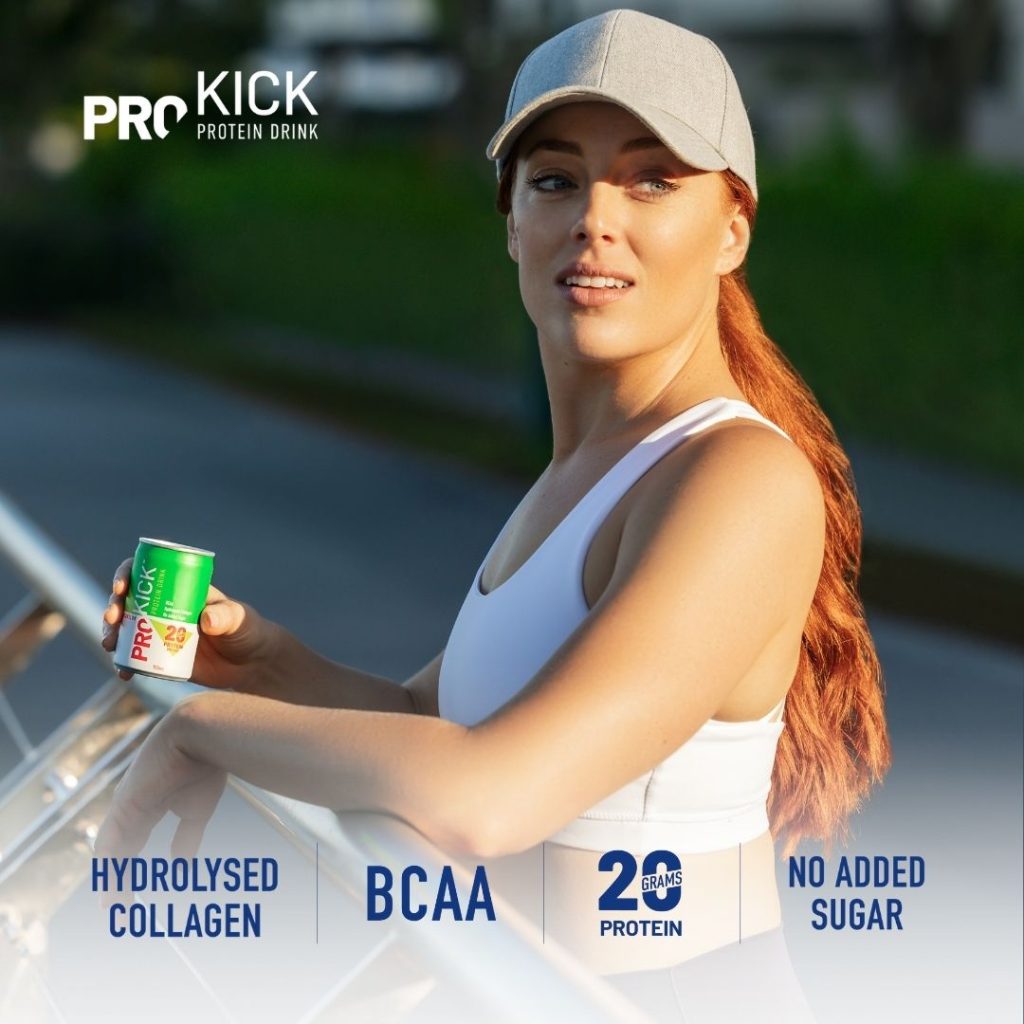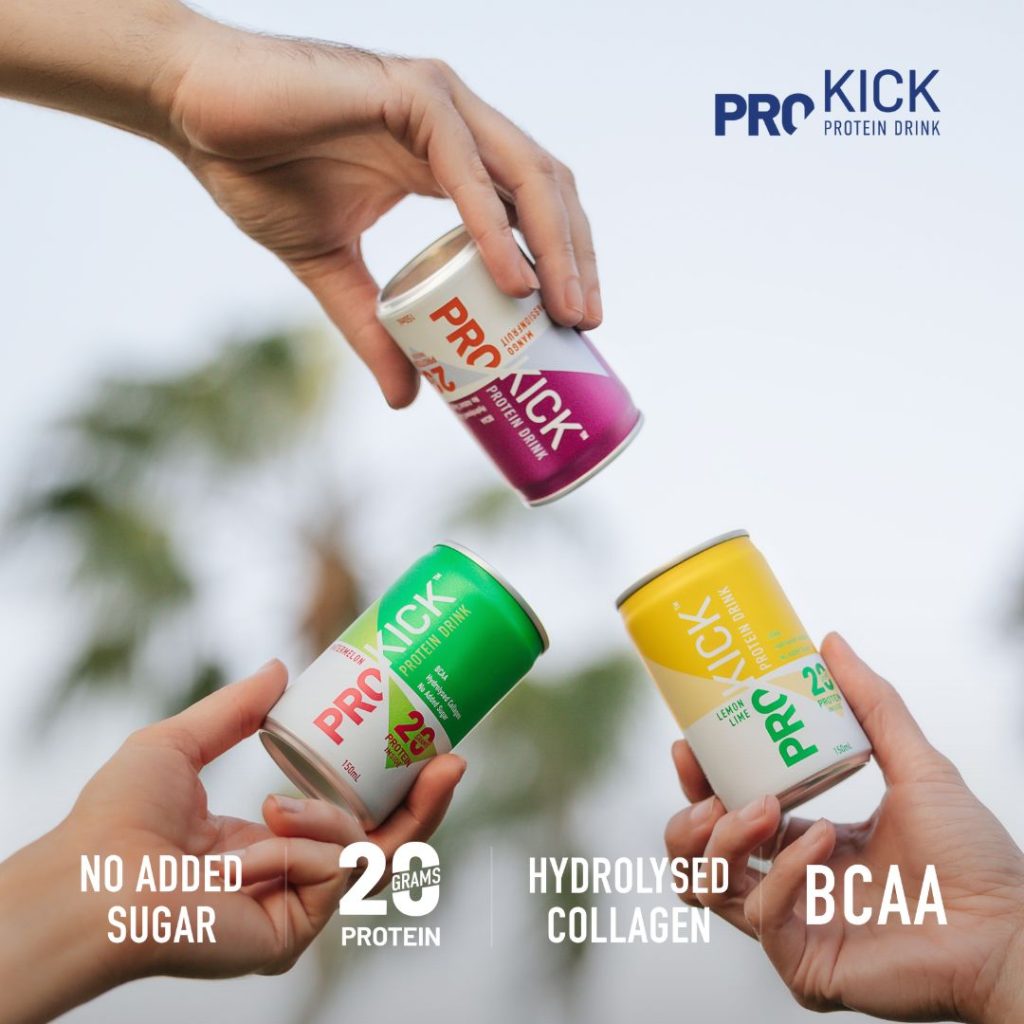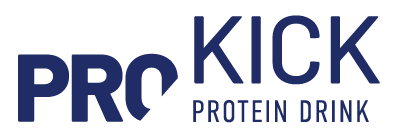Whey protein is one of the most common exercise supplements in the world, with a global market value of around US$10.3 billion. But another protein supplement, collagen, is quickly gaining popularity – as much for its skin health benefits as for its effects on muscles and joints.
In this article, we’ll take a science-based approach to look at whether collagen or whey protein is better for exercise.
Short on time? Read the summary.
Table of Contents
What Is Hydrolysed Collagen?
Collagen is the most common protein in humans, making up around a third of the total protein in your body (Khatri). It’s found in everything from your bones and muscles to your cells and hair, although its main roles involve maintaining skin elasticity and supporting the health of connective tissues like ligaments and tendons (Khatri). There are 28 identified forms of collagen (Leon-Lopez).
Like all proteins, collagen is made up of amino acids – specifically, glycine, proline and hydroxyproline (Khatri). The three weave together in protein chains to form a triple-helix structure, which is what makes collagen such a strong protein (and why many of its roles in the body relate to tissue flexibility and durability) (Khatri). Collagen also contains 16 other amino acids in smaller amounts (Gauz).
While collagen can be obtained from dietary sources like meat, fish, and poultry, hydrolysed collagen supplements like ProKick offer an effective, convenient way to get the right intake without feeling bloated or heavy.
Hydrolysed collagen (also known as collagen hydrolysate) is native collagen that has been broken down into collagen peptides. It’s easier for your body to digest and use than native collagen (Manninen).
What Is Whey Protein?
Whey protein is a type of protein derived from milk. On average, cow’s milk contains around 3.8% protein, of which around 80% is casein and 20% is whey protein (Teixera). There are three main types of whey supplement:
- Whey protein isolate (WPI), which is made up of 90–95% protein,
- Whey protein concentrate (WPC), which is made up of fat, lactose, minerals, and 20–85% protein, and
- Whey protein hydrolysate (WPH), which is typically higher in protein and lower in fat than WPC (Park, Teixera).
You can get whey protein naturally from dairy products like milk and cheese, but it’s also one of the most popular sports supplements, with both WPI and WPC available in powders and drinks.
Before You Choose a Supplement
If you’re reading this article, you’re probably thinking about making a choice – supplement with whey protein or supplement with collagen? (After all, the more supplements you take, the more money you have to spend.)
It’s worth mentioning that neither whey protein nor collagen will give you the results you want if you haven’t got the basics right. A balanced diet high in whole foods, regular exercise (both cardio and resistance or strength training), at least seven hours of high-quality sleep per night, and stress mediation (for example, meditation or social interaction) are the cornerstones of good health. Supplements build on those four behaviours – they can’t replace them.
To find out more about sleep hygiene, visit the Sleep Foundation. For personalised advice about diet, exercise, and mental health, talk to an Accredited Practising Dietitian, qualified personal trainer, or licensed mental health professional respectively.
Muscle Growth: Collagen or Whey Protein?
Whey protein is one of the most popular sports supplements available, and for good reason: it’s an incredibly effective supplement to help build and maintain muscle mass in combination with a strategic training and/or rest regime.
Dozens of scientific studies support the use of whey protein (Morton, Davies). Whey’s impact on the two big levers of muscle growth – muscle protein synthesis (anabolism) and reduced muscle protein breakdown (catabolism) – is likely the result of three main factors (Hulmi).
One, it’s fast to digest – amino acids become available quicker than from slow-release proteins like casein (Hulmi). Two, it contains proteins like lactoglobulin, which are rich in important amino acids like leucine (Hulmi). Three, it increases anabolic hormones like growth hormone, insulin-like growth factor, and testosterone, which all contribute to muscle growth (Hulmi).
While collagen has been proven to support muscle growth, it isn’t as effective as whey (Oertzern). Multiple studies have shown that whey protein has a greater impact on muscle growth than hydrolysed collagen when taken after training (Oikawa, Impey, Jacinto). If you’re worried that relying on collagen will stunt your training, though, don’t be – it’s still a good form of protein that also contains the BCAA leucine, and studies have shown that it does increase post-workout recovery and muscle synthesis (Gauza, Khatri).
- Best for Muscle Growth: Whey Protein

Hydrolysed Collagen, Enriched With BCAAs
ProKick Protein Drink is the easiest way to get your post-workout fix – a little can of can-do packed with protein and BCAAs.
- 20g of protein per serve
- Hydrolysed Collagen
- Branched-chain amino acids (BCAAs)
- Gluten- and nut-free
- No added sugar or artificial colours or flavours
- Made in Australia by Flavour Creations
Injury Prevention and Recovery: Collagen or Whey Protein?
Want to kill your fitness gains? There’s no better way to do it than by injuring yourself. Even minor muscular issues can lead to weeks at the physio instead of the gym. More serious joint- and tendon-related problems can derail your training for months or even years – and, worse, can re-emerge as you get older.
Both collagen and whey protein have roles in injury prevention and recovery. As proteins, they can improve general post-workout recovery and offset muscle loss during longer periods of injury (Davies, Turnagöl). Protein is also the most important macronutrient in the healing process, so consuming protein while injured may help you get back on your feet faster.
There isn’t much evidence for whey protein, specifically, as an injury prevention and recovery tool. While some studies have shown that whey protein improves recovery, it’s not clear whether those impacts are due to its unique properties or simply because it’s a good source of protein (Huang).
Collagen, on the other hand, has been widely studied as a way to prevent and repair injuries to tendons, joints, and connective tissues. Almost all studies have found that collagen has beneficial impacts and no side effects, although exactly what those benefits look like varies (Martinez).
Hydrolysed collagen has been proven to increase collagen type II synthesis, which is the type of collagen found in cartilage (Clark, Khatri, Bello). Having stronger cartilage may mean you’re less likely to suffer a joint-related injury.
Plenty of studies also show collagen can decrease joint pain during exercise and improve post-injury function (Khatri, Zdedziblik, Martinez). (It can improve osteoarthritis symptoms too (Bello).) If you do want to use collagen to alleviate joint pain, try supplementing with hydrolysed collagen in doses of 5 to 60 grams per day – most studies have used hydrolysed collagen in 5–10-gram doses (Martinez).
Similarly, taking collagen can support stronger, healthier tendons, which might help prevent injury. Tendons are mostly made up of collagen, although, unlike cartilage, most tendon collagen is Type I (Hijlekma). Some studies have indicated that collagen may help speed up recovery from tendon injuries, although more research is still needed on exact dosages, collagen types, and timeframes (Hijlekma).
- Best for Injury Prevention & Recovery: Hydrolysed Collagen
Other Considerations for Choosing Between Whey and Collagen
Effectiveness isn’t the only consideration when you buy a supplement. Cost is also a big factor – and so is how well your body tolerates it.
Both collagen and whey protein are considered very safe when taken at normal dosages. If you consume an excessive amount of protein, you might experience side effects like stomach pains and cramps.
Whey protein is a dairy product, so, if you’re lactose-intolerant or allergic to dairy, look to an alternate source of protein, like collagen or plant protein. (If you’re intolerant and not allergic, WPI could be an option – because it undergoes more processing than WPC, many lactose-intolerant people report fewer or no side effects when taking it.) Some people may also be allergic to whey protein specifically (Zhang).
Similarly, some types of collagen come from fish, which can be a problem for people with seafood allergies. One study found that 21% of people with seafood allergies are also allergic to marine collagen (Kalic). By contrast, do exist but are very rare.
- Least Likelihood of Side Effects: Hydrolysed Bovine Collagen
Do You Have to Choose Just One Supplement?
Whey protein and collagen are both great supplements for exercise – do you have to choose just one? If you have the budget and spare calories to take whey protein and collagen, it’s worth thinking about.
Whey protein is better for muscle growth and has a well-rounded amino acid profile. Collagen, on the other hand, is an effective way to prevent and manage connective tissue injuries. When taken together – as part of a balanced diet high in whole foods – you’re likely to see improvements in both your performance and recovery.
Just as importantly, whey protein and collagen have different sources. If you’re lactose-intolerant (or just can’t tolerate high doses of whey), then collagen can be easier to digest.
Final Word
There’s no such thing as a ‘best’ supplement – especially in the whey protein versus collagen debate. Both are well-studied sources of protein that can help you improve your fitness outcomes. Exactly which one you prefer depends on your health circumstances and fitness goals.
Generally, whey protein is better if you want to increase muscle mass or if you’re on a budget. Collagen can be better if you’re focused on injury prevention or if you don’t tolerate dairy well. In an ideal world, you’d take both – whey for muscle gains, and collagen for injury prevention.
Medical information on the ProKick website is merely informational and is not the advice of a medical practitioner. This information is general in nature and was accurate at the time of publication. For more information about nutrition and your individual needs, see a GP or an Accredited Practising Dietitian.

20g of Bovine Collagen, Enriched With BCAAs
ProKick Protein Drink is the easiest way to get your post-workout fix – a little can of can-do packed with protein and BCAAs.
- 20g of protein per serve
- Hydrolysed Collagen
- Branched-chain amino acids (BCAAs)
- Gluten- and nut-free
- No added sugar or artificial colours or flavours
- Made in Australia by Flavour Creations
Khatri, M., Naughton, R. J., Clifford, T., Harper, L. D., & Corr, L. (2021). The effects of collagen peptide supplementation on body composition, collagen synthesis, and recovery from joint injury and exercise: a systematic review. Amino Acids, 53(10), 1493–1506. DOI: 10.1007/s00726-021-03072-x
León-López, A., Morales-Peñaloza, A., Martínez-Juárez, V. M., Vargas-Torres, A., Zeugolis, D. I., & Aguirre-Álvarez, G. (2019). Hydrolyzed Collagen—Sources and Applications. Molecules, 24(22), 4031. DOI: 10.3390/molecules24224031
Gauza-Włodarczyk, M., Kubisz, L., & Włodarczyk, D. (2017). Amino Acid Composition in Determination of Collagen Origin and Assessment of Physical Factors Effects. International Journal of Biological Macromolecules, 104, 987–991. DOI: 10.1016/j.ijbiomac.2017.07.013
Manninen, A. H. (2009). Protein hydrolysates in sports nutrition. Nutrition & Metabolism, 6(38). DOI: 10.1186/1743-7075-6-38
Teixeira, F. J., Santos, H. O., Howell, S. L., & Pimentel, G. D. (2019). Whey Protein in Cancer Therapy: A Narrative Review. Pharmacological Research, 144, 245–256. DOI: 10.1016/j.phrs.2019.04.019
Park, Y., Park, H.-Y., Kim, J., Hwang, H., Jung, Y., Kreider, R., & Lim, K. (2019). Effects of whey protein supplementation prior to, and following, resistance exercise on body composition and training responses: A randomized double-blind placebo-controlled study. Journal of Exercise Nutrition & Biochemistry, 23(2), 34–44. DOI: 10.20463/jenb.2019.0015
Jäger, R., Kerksick, C. M., Campbell, B. I. et al. (2017). International Society of Sports Nutrition Position Stand: protein and exercise. Journal of the International Society of Sports Nutrition, 14(20). DOI: 10.1186/s12970-017-0177-8Morton, R. W., Murphy, K. T., McKellar, S. R., Schoenfeld, B. J., Henselmans, M., Helms, E., Aragon, A. A., Devries, M. C., Banfield, L., Krieger, J. W., & Phillips, S. M. (2018). A systematic review, meta-analysis and meta-regression of the effect of protein supplementation on resistance training-induced gains in muscle mass and strength in healthy adults. British Journal of Sports Medicine, 52(6), 376–384. DOI: 10.1136/bjsports-2017-097608
Davies, R. W., Carson, B. P., & Jakeman, P. M. (2018). The Effect of Whey Protein Supplementation on the Temporal Recovery of Muscle Function Following Resistance Training: A Systematic Review and Meta-Analysis. Nutrients, 10(2), 221. DOI: 10.3390/nu10020221.
Hulmi, J. J., Lockwood, C. M., Stout, J. R. (2010). Effect of protein/essential amino acids and resistance training on skeletal muscle hypertrophy: A case for whey protein. Nutrition & Metabolism, 7(1), 51–0. DOI: 10.1186/1743-7075-7-51
Oertzen-Hagemann, V., Kirmse, M., Eggers, B., Pfeiffer, K., Marcus, K., de Marées, M., & Platen, P. (2019). Effects of 12 Weeks of Hypertrophy Resistance Exercise Training Combined with Collagen Peptide Supplementation on the Skeletal Muscle Proteome in Recreationally Active Men. Nutrients, 11(5), 1072. DOI: 10.3390/nu11051072
Turnagöl, H. H., Koşar, S. N., Güzel, Y., Aktitiz, S., & Atakan, M. M. (2022). Nutritional Considerations for Injury Prevention and Recovery in Combat Sports. Nutrients, 14(1). DOI: 10.3390/nu14010053
Huang, W.-C., Chang, Y.-C., Chen, Y.-M., Hsu, Y.-J., Huang, C.-C., Kan, N.-W., & Chen, S.-S. (2017). Whey Protein Improves Marathon-Induced Injury and Exercise Performance in Elite Track Runners. International Journal of Medical Sciences, 14(7), 648–654. DOI: 10.7150/ijms.19584
Martínez-Puig, D., Costa-Larrión, E., Rubio-Rodríguez, N., & Gálvez-Martín, P. (2023). Collagen Supplementation for Joint Health: The Link between Composition and Scientific Knowledge. Nutrients, 15(6). DOI: 10.3390/nu15061332
Clark, K. L., Sebastianelli, W., Flechsenhar, K. R., Aukermann, D. F., Meza, F., Millard, R. L., Deitch, J. R., Sherbondy, P. S., Albert, A. (2008). 24-Week study on the use of collagen hydrolysate as a dietary supplement in athletes with activity-related joint pain. Current Medical Research and Opinion, 24(5), 1485–1496. DOI: 10.1185/030079908X291967
Zdzieblik, D., Oesser, S., Gollhofer, A., & König, D. (2017). Improvement of activity-related knee joint discomfort following supplementation of specific collagen peptides. Applied Physiology, Nutrition and Metabolism, 42(6), 588–595. DOI: 10.1139/apnm-2016-0390.
Bello, A. E., & Oesser, S. (2006). Collagen hydrolysate for the treatment of osteoarthritis and other joint disorders: a review of the literature. Current Medical Research and Opinion, 22(11), 2221–2232. DOI: 10.1185/030079906X148373.
Hijlekema, A., Roozenboom, C., Mensink, M., & Zwerver, J. (2022). The impact of nutrition on tendon health and tendinopathy: a systematic review. Journal of the International Society of Sports Nutrition, 19(1), 474–504. DOI: 10.1080/15502783.2022.2104130
Oikawa, S. Y., Kamal, M. J., Webb, E. K., McGlory, C., Baker, S. K., & Phillips, S. M. (2020). Whey protein but not collagen peptides stimulate acute and longer-term muscle protein synthesis with and without resistance exercise in healthy older women: a randomized controlled trial. The American Journal of Clinical Nutrition, 111(3), 708–718. DOI: 10.1093/ajcn/nqz332
Impey, S. G., Hammond, K. M., Naughton, R., Langan-Evans, C., Shepherd, S. O., Sharples, A. P., Cegielski, J., Smith, K., Jeromson, S., Hamilton, D. L., Close, G. L., & Morton, J. P. (2018). Whey Protein Augments Leucinemia and Postexercise p70S6K1 Activity Compared With a Hydrolyzed Collagen Blend When in Recovery From Training With Low Carbohydrate Availability. International Journal of Sport Nutrition and Exercise Metabolism, 28(6), 651–659. DOI: 10.1123/ijsnem.2018-0054
Jacinto, J. L., Nunes, J. P., Gorissen, S. H. M., Capel, D. M. G., Bernardes, A. G., Ribeiro, A. S., Cyrino, E. S., Phillips, S. M., & Aguiar, A. F. (2022). Whey Protein Supplementation Is Superior to Leucine-Matched Collagen Peptides to Increase Muscle Thickness During a 10-Week Resistance Training Program in Untrained Young Adults. International Journal of Sport Nutrition and Exercise Metabolism, 32(3), 133–143. DOI: 10.1123/ijsnem.2021-0265
Zhang, Z., Ma, R., Xu, Y., Chi, L., Li, Y., Mu, G., & Zhu, X. (2022). Investigation of the Structure and Allergic Potential of Whey Protein by Both Heating Sterilization and Simulation with Molecular Dynamics. Foods, 11(24). DOI: 10.3390/foods11244050



